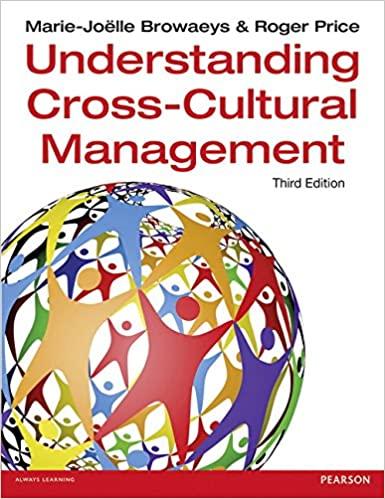Question
Corporate governance is a central and dynamic aspect of the business. The importance of corporate governance for corporate success as well as for social welfare
Corporate governance is a central and dynamic aspect of the business. The importance of corporate governance for corporate success as well as for social welfare cannot be overstated. Examples of massive corporate collapses resulting from weak systems of corporate governance have highlighted the need to improve and reform corporate governance at the international level. In the wake of Enron, Parmalat, and other similar cases, countries around the world have reacted quickly by pre-empting similar events domestically. As a speedy response to these corporate failures, the USA issued the Sarbanes Oxley Act in July 2002. In January 2003, the Higgs's Report and the Smith Report were published in the UK. This publication again was in response to the recent corporate governance failures.
Consequently, corporate governance has become one of the most commonly used phrases in the current global business vocabulary. The notorious collapse of Enron 2001, one of America's largest companies, has focused international attention on company failures. In addition, it also presents the role that strong corporate governance play in preventing these failures. "Corporate governance" comprises of a country's private and public institutions, both formal and informal, which together govern the relationship between the people who manage corporations (corporate insiders) and all others who invest resources in various corporations in the country. Therefore, corporate governance generally refers to the set of rule-based processes of laws, policies, and accountability that governs the relationship between the investor (stockholder of a company) and the investee (management). Corporate governance attracts a great deal of attention in the aftermath of the Asian financial crisis of 1997-1998 and the early 2000s U.S. corporate scandals, like Enron and WorldCom.
However, after the threat of global contagion financial crises passed, corporate governance was relegated to the back of academic research.
The Collapse of Enron
In 2001, Enron became a household name and probably in most households in most countries around the world.
On the 2nd of December 2001, Enron became one of the 10 largest companies in the USA. In the following months, more and more evidence emerged about the weaknesses and fraudulent activity of corporate governance. However, countries across the world have been unsettled and disturbed by the shock of this event and are now examining their own corporate governance systems in micro-detail. This they do by looking for similar weaknesses and potential like Enrons. Enronitis has spread across the globe like a lethal virus, infecting every company and every shareholding institutions. In addition, it also had a significant effect on worrying even by the smallest shareholder and unnerving the financial markets.
Enron was a Huston-based energy company founded by a brilliant entrepreneur, Kenneth Lay. The company was created in 1985 by a merger of two American gas pipeline companies. Within a period of 16 years, the company was transformed from a relatively small concern, involved in gas pipelines, and oil and gas exploration, to the world's largest energy trading company (The Economist, 28 November 2002). Enron, the champion of energy deregulation that grew into one of the nation's 10 largest companies, collapsed yesterday. This collapse occurred after a rival backed out of a deal to buy Enron, and after many big trading partners stopped doing business with the company.
Enron, based in Houston, has been widely expected to seek bankruptcy protection. With $62 billion in assets as of September 30, it would be the biggest American company ever to go bankrupt. Hence, this company dwarfs the filing by Texaco in 1987. Late in the day, Enron's chief financial officer, Jeff McMahon, stated that the company was still talking to banks about restructuring and consideration of other options.
Clearly, corporate governance check and balances can only serve to detect, not cure, unethical practices. A complicating factor in issues of fraud and ethical breakdown is the intangible nature of fraud. In addition, there is a grey area surrounding what is right or wrong, good or bad in human behavior. Some comments made by Sheldon Zenrier, an American white-collar criminal and civil lawyer, when speaking of the Enron trial, helped to illuminate this issue.
Questions to Ponder:
How would you apply the two approaches in corporate governance in the case of Enron? Explain briefly your answer.
What ethical issue in corporate governance did Enron fail to do? Use the following theories in your explanation:
a. Agency Theory
b.Stewardship Theory
c.Stakeholder Theory
If you were part of management then, what would you recommend Enron to do to have solved its ethical issue? Draft a short explanation.
Step by Step Solution
There are 3 Steps involved in it
Step: 1
Corporate Governance Approaches in the Case of Enron 1 ComplianceBased Approach Enforce strict regulatory frameworks and guidelines to ensure adherenc...
Get Instant Access to Expert-Tailored Solutions
See step-by-step solutions with expert insights and AI powered tools for academic success
Step: 2

Step: 3

Ace Your Homework with AI
Get the answers you need in no time with our AI-driven, step-by-step assistance
Get Started


